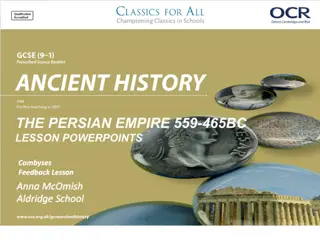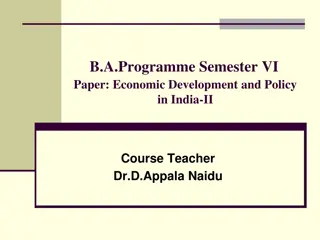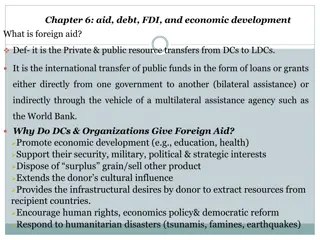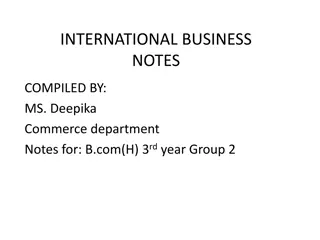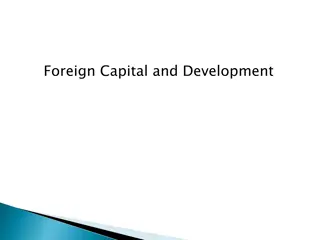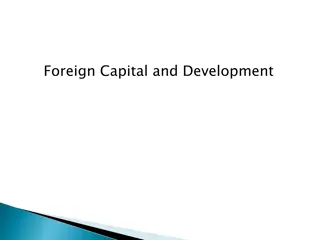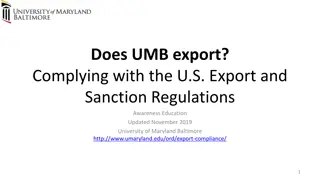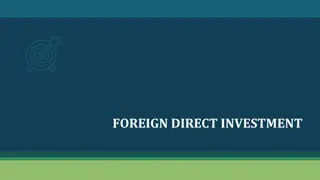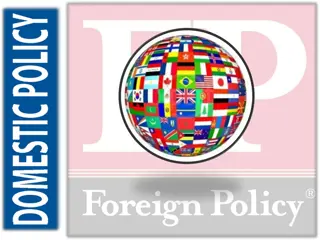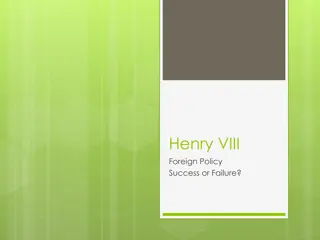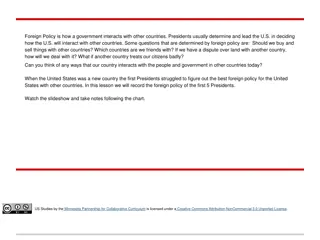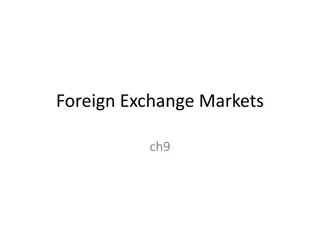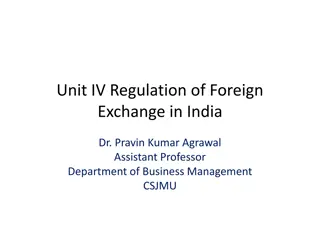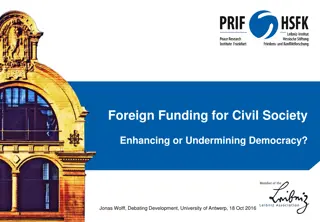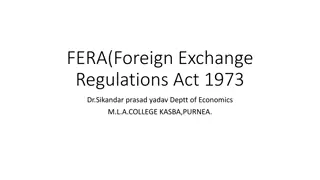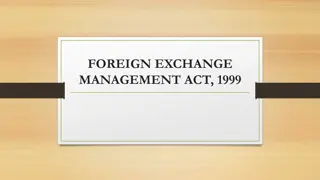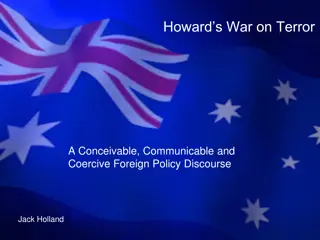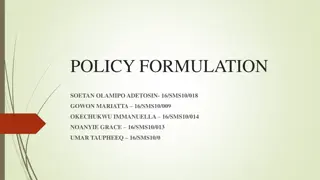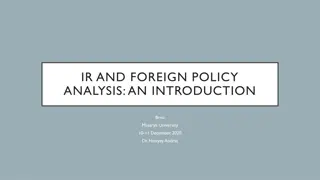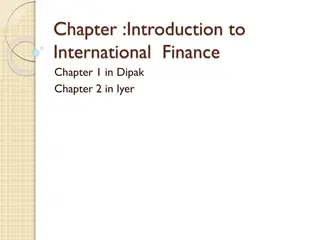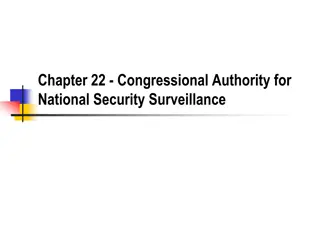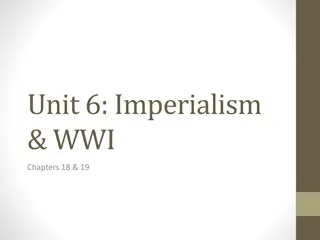Safeguarding Canada's Research: Policy on Sensitive Technology Research and Affiliations of Concern (STRAC)
Canada's new Policy on Sensitive Technology Research and Affiliations of Concern (STRAC) aims to protect the country's research ecosystem from foreign entities posing security risks. The policy restricts funding for projects involving sensitive technology research if affiliated with military or stat
1 views • 10 slides
Foreign Investments in India: Legal Framework and Investment Routes
Key statutes applicable for foreign investors in India include FEMA, SEBI regulations, and legislations governing securities markets. Foreign investments avenues in India include FDI, FVCI, FPI, NRI investments through SEBI approval or automatic approval route. Foreign Portfolio Investors (FPIs) and
1 views • 54 slides
Anesthetic Management of Bronchoscopy for Airway Foreign Body
This article discusses the anesthetic management of bronchoscopy for airway foreign body, including presentation, preoperative work-up, intraoperative management, and postoperative care. It highlights the incidence of foreign body inhalation, immediate and delayed presentations, findings on chest X-
2 views • 32 slides
Comparing Cambyses and Cyrus: Foreign Policy Perspectives
Explore the contrasting foreign policy approaches of Cambyses and Cyrus, focusing on their views towards foreign peoples, religion, and leadership. Analyze historical evidence to uncover the differences in their treatment of conquered territories and cultures. Evaluate the reliability issues surroun
0 views • 6 slides
Economic Development and Foreign Trade Policies in India
The economic development and policy in India with a focus on foreign trade policies are discussed in this paper. It covers the historical phases of India's trade policy, objectives, and the impact of economic development on foreign trade. The paper also delves into the various theories of foreign tr
0 views • 14 slides
Understanding Foreign Aid, Debt, FDI, and Economic Development
Foreign aid refers to the transfer of resources from developed countries to less developed countries to promote economic development, support security interests, and address humanitarian needs. Donors give aid for political and economic reasons, with foreign exchange constraints playing a significan
1 views • 31 slides
Accounting for Foreign Branches: Converting Trial Balances and Exchange Rates
A foreign branch maintains its accounts in a foreign currency, requiring the head office to convert the trial balance into its own currency before finalizing accounts. Fixed and fluctuating exchange rates impact the conversion process, with specific rules for fixed assets, liabilities, and current a
0 views • 7 slides
Understanding International Financial Environment and Foreign Exchange Markets
The international financial system encompasses the management and trading of international money and monetary assets. This involves transactions in foreign currency, foreign deposits, investments, and assets. The foreign exchange market facilitates the exchange of currencies, determining exchange ra
0 views • 20 slides
Understanding Foreign Capital and Its Implications on Development
Foreign capital plays a significant role in the development of a country through investments from foreign governments, institutions, and individuals. It encompasses various forms such as foreign aid, commercial borrowings, and investments that contribute to capital formation, technology utilization,
0 views • 19 slides
Selection and Appointment of Foreign Sales Agents: A Comprehensive Guide
Learn about the process of selecting and appointing foreign sales agents in international marketing, including the meaning of agency, content of foreign sales agency contracts, reasons for appointing agents, factors influencing agent selection, as well as the advantages and disadvantages of working
1 views • 12 slides
Understanding Foreign Capital and Its Impact on Development
Foreign capital encompasses investments from foreign governments, private individuals, and international organizations in a country, including aid, commercial borrowings, and foreign investments. It plays a crucial role in capital formation, technology utilization, and development across various sec
0 views • 19 slides
Understanding U.S. Export Control Regulations
U.S. export control regulations are crucial for national security, foreign policy, and economic interests. This includes governing the export of strategic technologies, equipment, hardware, software, and the provision of technical assistance to foreign persons. The regulations aim to prevent the una
0 views • 68 slides
Understanding Foreign Direct Investment (FDI) Regulations
Explore the essential concepts and regulations surrounding Foreign Direct Investment (FDI) including FDI policy, FEMA regulations, capital instruments, equity shares, and the distinction between FDI and Foreign Portfolio Investment (FPI). Gain insights into FDI entry routes, acquisition strategies,
0 views • 20 slides
George Washington's Foreign Policy and Its Impact on the Early United States
George Washington played a pivotal role in crafting a foreign policy that prioritized neutrality and avoided entanglements in European conflicts. His approach to diplomacy and decision-making laid the foundation for future foreign relations strategies in the nascent United States.
0 views • 14 slides
Analysis of Henry VIII's Foreign Policy Success and Failure
An overview of Henry VIII's foreign policy up to 1547, discussing the shift in his approach during the 1530s and the revival of ambitions in the 1540s. The content explores traditional and revisionist views on Henry's foreign affairs, including his involvement in Scotland and France, alliances with
0 views • 34 slides
Best Foreign Currency Exchange in Tanglin
If you\u2019re looking for a Foreign Currency Exchange in Tanglin, contact Classic Exchange. Their foreign currency exchange company provides reliable, efficient, and competitive foreign exchange services tailored to meet the diverse needs of travele
0 views • 6 slides
Understanding Foreign Policy: The First Five US Presidents
Foreign policy is crucial in how a government interacts with other countries. The first five US Presidents - George Washington, John Adams, Thomas Jefferson, James Madison, and James Monroe - faced challenges in determining the country's foreign policy, dealing with issues like neutrality, isolation
0 views • 28 slides
Washington Irving: Father of American Fiction and Pioneer of American Romanticism
Washington Irving, an influential American author of the early 19th century, is revered as the Father of American fiction. Known for iconic works like "The Legend of Sleepy Hollow" and "Rip Van Winkle," Irving played a crucial role in establishing American literature as an independent art form. His
1 views • 14 slides
Foreign-Owned Enterprises (FOEs) in the South Bay
Foreign-Owned Enterprises (FOEs) play a significant role in the South Bay region, contributing substantially to its economy. Foreign firms from developed nations like Japan, UK, and Germany have a strong presence in the area. The concentration of FOEs in cities correlates with improved performance.
0 views • 18 slides
Understanding Foreign Exchange Markets and Risks
Financial managers need to grasp the operations of foreign exchange markets for global business success. These markets allow participants to trade currencies, raise capital, transfer risk, and speculate on currency values. Transactions expose businesses to foreign exchange risk, where fluctuations i
0 views • 40 slides
Foreign Exchange Regulations in India: FERA and FEMA Overview
The Foreign Exchange Regulations in India are governed by acts like FERA and FEMA, aimed at regulating, controlling, and ensuring proper utilization of foreign exchange to promote economic development. FERA, enacted in 1973, was later replaced by FEMA in 2000 to facilitate external trade, payments,
0 views • 42 slides
Directorate General of Foreign Trade: Promoting India's Exports and Trade
India's Directorate General of Foreign Trade, under the Ministry of Commerce, is responsible for formulating trade policies, promoting exports, and facilitating trade activities. With a focus on enhancing export performance, the DGFT plays a crucial role in supporting India's economic growth through
0 views • 22 slides
Unit Assessment Review: U.S. Imperialism History Lesson
Review session for upcoming history unit assessment on U.S. Imperialism. Topics covered include key events such as the Philippines under American control, reasons for Mark Twain's anti-Imperialist stance, factors driving American foreign policy towards imperialism, the case of Hawaii's Queen Liliuok
0 views • 15 slides
Foreign Funding for Civil Society: Enhancing or Undermining Democracy?
The discussion revolves around the impact of foreign funding on civil society organizations (CSOs) and democracy. It explores legal restrictions, political targeting, and the trend of limiting foreign funding in approximately 50 countries since 2000. Various case studies from Bolivia, Egypt, Ethiopi
0 views • 10 slides
Challenges Faced in Prioritizing Foreign Language Education
Throughout Europe, foreign language education is emphasized early on in schools, with a high percentage of nations focusing on language learning. In contrast, the United States lags behind in prioritizing foreign language programs in K-12 education, influenced by cultural factors and a lack of aware
0 views • 16 slides
Morality in UK Drug Policy: Policy Constellations Analysis
Morality plays a significant role in shaping drug policy in the UK, as revealed by the research conducted by Professor Alex Stevens at the University of Kent. The study investigates the moral commitments underlying different policy positions in UK drug policy debates, highlighting five ethico-politi
0 views • 19 slides
The Monroe Doctrine and the Roosevelt Corollary: Evolution of US Foreign Policy
The content explores the historical context and evolution of US foreign policy through the Monroe Doctrine of 1823 and the Roosevelt Corollary of 1904. It discusses the principles outlined in each doctrine, their implications on US interactions with other nations in the Western Hemisphere, and the s
0 views • 4 slides
Italian Foreign Policy in the Middle East: Historical Perspectives
The historical analysis delves into Italian foreign policy in the Middle East, emphasizing the divergent scholarly views on Fascist-era objectives and the territorial aspirations of Mussolini's regime. It explores pre-Fascist interests, colonial endeavours, and the complex interplay between traditio
0 views • 21 slides
APUSH Key Concept 4.3 Review: U.S. Foreign Policy and Expansion
The U.S.'s interest in foreign trade and expanding national borders influenced its foreign policy. Initiatives like the Monroe Doctrine and westward expansion led to conflicts over slavery, plantation slavery spread westward, and antislavery efforts increased in the North.
0 views • 8 slides
Overview of Foreign Exchange Regulations Act 1973 in India
The Foreign Exchange Regulations Act (FERA) of 1973 in India imposed strict regulations on foreign exchange transactions, payments, and securities dealings. It included restrictions on currency import/export, illegal payments, dealings in foreign exchange, export payments regulated by RBI, bearer se
0 views • 4 slides
Foreign Exchange Management Act, 1999: Overview and Structure
The Foreign Exchange Management Act (FEMA) of 1999 replaced the Foreign Exchange Regulation Act (FERA) and empowers the Reserve Bank of India to regulate foreign exchange transactions. FEMA imposes restrictions on foreign exchange dealings and requires transactions to be conducted through authorized
0 views • 6 slides
Australia's Foreign Policy Discourse in Howard's War on Terror
Australian foreign policy under Howard's leadership during the War on Terror was shaped by a unique language and discourse that made it conceivable, communicable, and coercive. The narrative explores the contextual background, theoretical framing, and response to events like 9/11 and Afghanistan, em
0 views • 11 slides
Understanding Foreign Aid: Types, Features, and Benefits
Foreign aid encompasses economic, technical, or military assistance from one nation to another, aiming at relief, recovery, or mutual protection. It is not solely monetary, including support in various forms like food aid, education, infrastructure, and health care. Types of foreign aid range from p
0 views • 16 slides
U.S. Expansion and Foreign Policy in the Early 19th Century
The U.S. focused on increasing foreign trade, expanding its borders, and isolating itself from European conflicts during the early 19th century. Key events such as the Louisiana Purchase, annexation of Texas, and treaties with China shaped U.S. foreign policy. Debates over slavery, territorial expan
0 views • 7 slides
Understanding Policy Formulation: Key Concepts and Approaches
Policy formulation is a crucial step in the policy-making process, involving identifying and crafting policy alternatives to address various issues. This phase requires participants to define policy problems, develop alternatives, and select the most feasible solutions based on criteria such as feas
0 views • 12 slides
American Literature Through the Ages
Explore the rich tapestry of American literature covering American Indian culture, New England Puritanism, the 18th century American Enlightenment, and the American Renaissance. Discover the oral traditions of American Indian tribes, the puritanical values of New England, the democratic origins of A
0 views • 17 slides
Foreign Policy Analysis: An Introduction and Overview
Explore the field of Foreign Policy Analysis (FPA) through an introduction to key concepts and questions. Delve into understanding why nations make certain foreign policy decisions, examining factors like alliances, historical context, and interdisciplinarity within FPA studies.
0 views • 62 slides
Understanding International Finance: Scope, Importance, and Challenges
International finance explores interactions between countries, including currency exchange rates, foreign direct investment, and risk management. The scope includes foreign exchange markets, MNC financial systems, and international accounting. It raises questions on liberalizing financial markets, I
0 views • 52 slides
Congressional Authority for National Security Surveillance under FISA
The Foreign Intelligence Surveillance Act (FISA) was passed in 1978 in response to abuses outlined in the Church Report. The Foreign Intelligence Surveillance Court (FISC) oversees FISA applications, with the ability for government appeal through the Foreign Intelligence Surveillance Court of Review
0 views • 82 slides
United States Foreign Policy Evolution from Imperialism to World War I
Explore the United States' foreign policy evolution from Imperialism to World War I, including the Open Door Policy, Dollar Diplomacy, and involvement in the Spanish-American War. Learn about the military actions in acquiring territories such as Puerto Rico, Guam, Philippines, and Hawaii. Delve into
0 views • 8 slides



